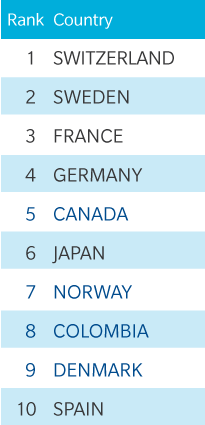While there is no simple solution, the latest edition of the Energy Sustainability Index, part of an annual report from the World Energy Council and Oliver Wyman, highlights how countries such as Switzerland, Sweden, and Germany are leading the pack in balancing these priorities, often through energy diversity and efficiency programs.
Energy Sustainability Index Leaders

Black = net energy importers;
blue = net energy exporters
Sources: IEA, EIA, World Bank, IMF, WEF
However, even these leaders tend to fall short on at least one dimension of the energy trilemma, according to latest report from Oliver Wyman and the WEC, a non-profit institution comprising most of the world's largest energy-producing and -consuming countries. As a result, government and industry must work together to address key tensions related to energy policy, the report concludes.
The specific areas of focus in this year's report include:
Addressing the demands of energy and mobility: With transportation the fastest-growing source of global carbon emissions, sustainable urban mobility is becoming a key target of energy policy.
Pursuing energy efficiency: Managing energy demand is highly effective but can also be expensive, hard to measure, and produce unexpected "rebound effects."
Implementing innovative financing mechanisms: The public sector plays a crucial role in creating a sense of stability and reducing policy-related uncertainties that may inhibit investments.
To download an executive summary of the report, "Policies for the Future: 2011 Assessment of Country Energy and Climate Policies," click on the link below. For the full report, see the "Related Links" box at right.







